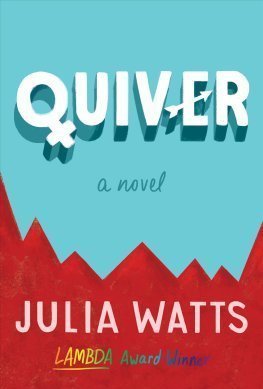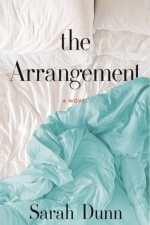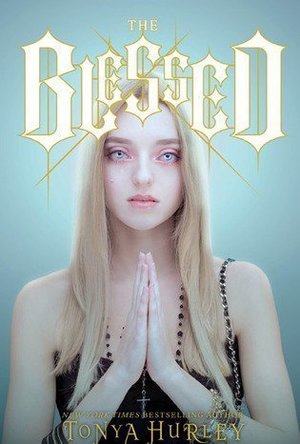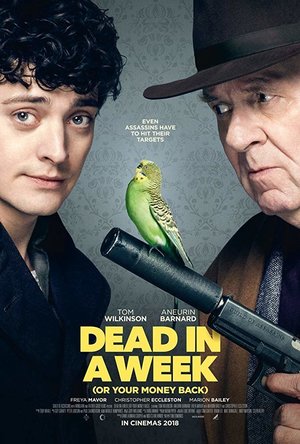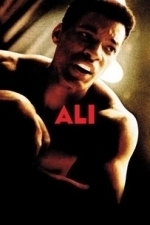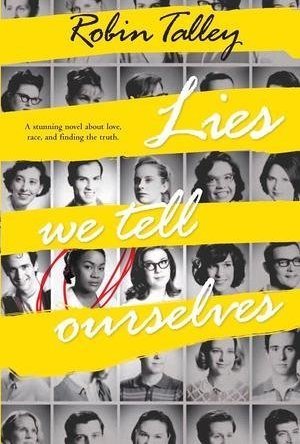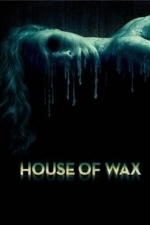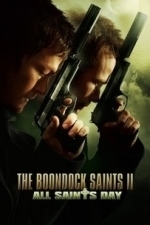Search
Search results
Lovely book that gets you thinking
Liberty "Libby" Hazlett is the oldest six kids (soon to be seven). She is part of an evangelical Christian family who practices the Quiverfull lifestyle--having as many kids as God deems they should. The father is the head of the family and his wife and children (especially the girls) should do everything he says, no matter what. Libby and her siblings are home-schooled and rarely see anyone outside of their family and church. So when a new family moves next door, it's a pretty big deal. Zo and her family are not exactly in the same vein religiously or politically as Libby's family. Still, Libby and Zo become fast friends--a friendship that may be cursed from the start. Spending time around Zo's family is eye-opening for Libby. But no one challenges Libby's father or their religion in her family. What does it mean for Libby that she's questioning her faith? And what will the repercussions be?
"It's all over the Bible--'be fruitful and multiply' and then there's Psalm 127 that says that children are like a warrior's arrows and 'blessed is the man whose quiver is full of them.' Some families like ours call themselves Quiverfull for that reason."
This was a really interesting, eye-opening, and sometimes scary novel. It was very well-written, and I really enjoyed it. A huge thanks to LibraryThing to introducing me to Julia Watts and her work. This novel is told in varying viewpoints between Libby and Zo, highlighting the stark contract between their upbringing and the way the two girls look at the world. It does an excellent job at showing how religion shapes your thought.
For Libby, her religious family is basically her entire life. We see how differently boys and girls are treated in her family, with the girls serving as helpmates in every way. She is not allowed any independent thought and is completely indoctrinated in her family's evangelical religion. Any thoughts she has that differ from her family's way of life make her feel strange and scared--and stepping out of line in any way means punishment. Even worse, she can't see any way out. Even though she doesn't want to, her future is set: getting married and having babies in the name of God.
Libby was so wonderfully written, and my heart ached for her. Watching her confront what she was taught, seeing her yearn for a different life--it really opened my eyes to how hard it must be for so many kids raised in religious homes. It's so easy to be derisive about religious views with which you don't agree, but the book did such an excellent job showing how Libby didn't have a choice: religion was such a part of her life from the moment she was born.
Zo's character was great, too. She didn't always seem as fleshed out to me, but it was refreshing to see a gender fluid character in YA literature. She was very down-to-earth, and it was nice to see her sexuality not be her defining characteristic. I also enjoyed how very feisty she was:
"The fact that Mr. Hazlett justifies his dictatorship through religion makes me think of all the families and communities and countries that have been torn apart because of people who claimed to be acting in the name of God."
This was a lovely book, which even had some surprises. It made me want to cry at times and laugh at others. It's very well-written and so beautiful to read. The subject matter is different, well-worth reading, and wrapped up in a very entertaining and interesting story. It certainly gets you thinking, plus it's very hard not to fall for Libby and Zo, too.
I received a copy of this novel from LibraryThing and Three Room Press in return for an unbiased review - thank you!
"It's all over the Bible--'be fruitful and multiply' and then there's Psalm 127 that says that children are like a warrior's arrows and 'blessed is the man whose quiver is full of them.' Some families like ours call themselves Quiverfull for that reason."
This was a really interesting, eye-opening, and sometimes scary novel. It was very well-written, and I really enjoyed it. A huge thanks to LibraryThing to introducing me to Julia Watts and her work. This novel is told in varying viewpoints between Libby and Zo, highlighting the stark contract between their upbringing and the way the two girls look at the world. It does an excellent job at showing how religion shapes your thought.
For Libby, her religious family is basically her entire life. We see how differently boys and girls are treated in her family, with the girls serving as helpmates in every way. She is not allowed any independent thought and is completely indoctrinated in her family's evangelical religion. Any thoughts she has that differ from her family's way of life make her feel strange and scared--and stepping out of line in any way means punishment. Even worse, she can't see any way out. Even though she doesn't want to, her future is set: getting married and having babies in the name of God.
Libby was so wonderfully written, and my heart ached for her. Watching her confront what she was taught, seeing her yearn for a different life--it really opened my eyes to how hard it must be for so many kids raised in religious homes. It's so easy to be derisive about religious views with which you don't agree, but the book did such an excellent job showing how Libby didn't have a choice: religion was such a part of her life from the moment she was born.
Zo's character was great, too. She didn't always seem as fleshed out to me, but it was refreshing to see a gender fluid character in YA literature. She was very down-to-earth, and it was nice to see her sexuality not be her defining characteristic. I also enjoyed how very feisty she was:
"The fact that Mr. Hazlett justifies his dictatorship through religion makes me think of all the families and communities and countries that have been torn apart because of people who claimed to be acting in the name of God."
This was a lovely book, which even had some surprises. It made me want to cry at times and laugh at others. It's very well-written and so beautiful to read. The subject matter is different, well-worth reading, and wrapped up in a very entertaining and interesting story. It certainly gets you thinking, plus it's very hard not to fall for Libby and Zo, too.
I received a copy of this novel from LibraryThing and Three Room Press in return for an unbiased review - thank you!
Kristy H (1252 KP) rated The Arrangement in Books
Feb 13, 2018
Lucy and Owen fled Brooklyn for the suburbs not long after their son, Wyatt, came along. In the perfect little town of Beekman, they have a beautiful old house, a yard full of chickens, and interact with a cast full of eclectic characters. Lucy also has her hands full with Wyatt, a challenging kid with autism. One evening, when some friends come over and the drinks flow freely, they mention their open marriage. At first, Lucy and Own are a bit shocked. But as the exhausted duo look around at their life, they begin to consider "the arrangement." Owen grabs a pad and a pen and they eke out some rules. It still seems like a joke, until Lucy says she wants to give the arrangement--a six-month experience where they each have an ongoing, no questions asked free pass in their marriage--a go. Surely nothing will go wrong, right?
This novel is a different, oddly intriguing read, offering an extremely realistic portrayal of marriage and raising children. Warm and fuzzy it is not, yet it's still engaging and features relatable characters. Lucy and Owen's exhaustion is palatable, as is Lucy's frustration and love for Wyatt, who is an intelligent, fun, and extremely challenging special needs kid. (You will grow to love him, even as you completely empathize with why poor Lucy might need a break--one of the definite strengths of the book.) For a good early portion of the novel, I found myself thinking I would be reading a quite grim look at parenthood and marriage. And it is, in many ways. After all, why are Lucy and Owen so willing to embark on the arrangement, you wonder? Are they bored with their life, with each other? Are they simply tired parents? What causes them to choose this? As the arrangement begins, their reactions to its ongoing presence in their lives is surprising, and Dunn does a good job at capturing some nuance in their character that you might not expect. These are real married people, with real issues.
Still, there are definitely some odd bits and pieces stuck into the story. It seems disjointed at times, and some of the characters and their stories seem to pop up at weird times, forcing you to remind yourself how they fit into Lucy and Owen's life and the town of Beekman (for we don't hear just from our main couple, but several others who live in town). The novel meanders at times, and I wouldn't call the ending closure, per se, though it falls in line with the realism of the novel.
Where Dunn shines is her humor, which slips through even some of the darker moments. Moments with Wyatt are perfectly captured. Lucy's friend, Sunny Bang, is one of the best things about this book, and you'll love every second featuring her. There's a scene at the town church with many of the local kids (and their pets) that is solely worth purchasing the entire book. Seriously, Dunn writes with a sharp wit, and it's one of the main reasons my rating upped to 3.5 stars. The book is often smartly funny and feminist, even if it has its depressing, wandering moments. It's a fascinating look at marriage, for sure, and I was certainly intrigued to see how the arrangement would play out. It was also a welcome break from all the thrillers I'd been reading lately, so thanks! If you like sharp and witty characters coupled with a psychological inside look at modern-day marriage, you'll find this one quite compelling. 3.5 stars.
I received a copy of this novel from the publisher and Netgalley (thank you) in return for an unbiased review. It is available everywhere as of 03/21/2017.
<center><a href="http://justacatandabookatherside.blogspot.com/">Blog</a>; ~ <a href="https://twitter.com/mwcmoto">Twitter</a>; ~ <a href="https://www.facebook.com/justacatandabook/">Facebook</a>; ~ <a href="https://plus.google.com/u/0/+KristyHamiltonbooks">Google+</a></center>;
This novel is a different, oddly intriguing read, offering an extremely realistic portrayal of marriage and raising children. Warm and fuzzy it is not, yet it's still engaging and features relatable characters. Lucy and Owen's exhaustion is palatable, as is Lucy's frustration and love for Wyatt, who is an intelligent, fun, and extremely challenging special needs kid. (You will grow to love him, even as you completely empathize with why poor Lucy might need a break--one of the definite strengths of the book.) For a good early portion of the novel, I found myself thinking I would be reading a quite grim look at parenthood and marriage. And it is, in many ways. After all, why are Lucy and Owen so willing to embark on the arrangement, you wonder? Are they bored with their life, with each other? Are they simply tired parents? What causes them to choose this? As the arrangement begins, their reactions to its ongoing presence in their lives is surprising, and Dunn does a good job at capturing some nuance in their character that you might not expect. These are real married people, with real issues.
Still, there are definitely some odd bits and pieces stuck into the story. It seems disjointed at times, and some of the characters and their stories seem to pop up at weird times, forcing you to remind yourself how they fit into Lucy and Owen's life and the town of Beekman (for we don't hear just from our main couple, but several others who live in town). The novel meanders at times, and I wouldn't call the ending closure, per se, though it falls in line with the realism of the novel.
Where Dunn shines is her humor, which slips through even some of the darker moments. Moments with Wyatt are perfectly captured. Lucy's friend, Sunny Bang, is one of the best things about this book, and you'll love every second featuring her. There's a scene at the town church with many of the local kids (and their pets) that is solely worth purchasing the entire book. Seriously, Dunn writes with a sharp wit, and it's one of the main reasons my rating upped to 3.5 stars. The book is often smartly funny and feminist, even if it has its depressing, wandering moments. It's a fascinating look at marriage, for sure, and I was certainly intrigued to see how the arrangement would play out. It was also a welcome break from all the thrillers I'd been reading lately, so thanks! If you like sharp and witty characters coupled with a psychological inside look at modern-day marriage, you'll find this one quite compelling. 3.5 stars.
I received a copy of this novel from the publisher and Netgalley (thank you) in return for an unbiased review. It is available everywhere as of 03/21/2017.
<center><a href="http://justacatandabookatherside.blogspot.com/">Blog</a>; ~ <a href="https://twitter.com/mwcmoto">Twitter</a>; ~ <a href="https://www.facebook.com/justacatandabook/">Facebook</a>; ~ <a href="https://plus.google.com/u/0/+KristyHamiltonbooks">Google+</a></center>;
Heather Cranmer (2721 KP) rated Precious Blood (The Blessed, #1) in Books
Jun 7, 2018 (Updated May 18, 2019)
Precious Blood was a book I'd been dying to read since it first became available to buy. Everything about it sounded super interesting. Whilst a lot of other reviewers didn't really care for the book, I absolutely loved it! This book had so many feels for me, and it's definitely one of my favorites so far this year.
Agnes, Cecilia, and Lucy are all admitted to the emergency room on the same night. Agnes has slit her wrists, Cecilia had drowned (and has been resuscitated), and Lucy has overdosed on some pills. On that fateful night, they are all given bracelets by the mysterious Sebastian. They seek him out and find him at a church. Sebastian tells the girls they are saints, but Sebastian has escaped from a mental institution and is listed as being very dangerous. Is Sebastian telling the truth or are the girls' lives in danger?
The world building, like the cover, was creepy and beautiful all at the same time. For the most part, it was easy to picture everything that was happening to Sebastian, the girls, and everyone else in my head. I love how Hurley makes it seem like something such as what happened in Precious Blood could actually happen at any time. The one thing that sort of bothered me was the insta-love between Sebastian and the girls. Perhaps it was more of hero worship, but it still happened quite quickly.
The pacing is what lets Precious Blood down a bit, but not by much. The pacing is not slow at all, yet it's the opposite. There are a few times where the pacing just totally takes off which left me feeling very confused and wondering what had just happened. In fact, I counted this happening as three times during the story. Maybe I just wasn't paying enough attention, but the story did seem to be missing some leeway those few times. Other then those times, the pacing really worked and definitely held my attention especially during the first two-thirds of the story.
I loved the plot! It was super interesting reading about these three girls' lives. They each brought their own baggage to the table. I was constantly wondering if Sebastian was delusional when he told the girls that they were reincarnated as martyred saints and were in danger or if he was actually being serious. I really enjoyed the way the story played out.
I thought the characters were very well written. I loved the innocence that Agnes seemed to have. The only thing I didn't like about Agnes was how she treated her mother. She was very rude to her. I don't know if there's more of a back story between Agnes and her mother, but if there was, it wasn't mentioned much in the book. My favorite character was Cecelia. She came across as being very hardcore and like she didn't care about many things, but she was actually quite a loving and caring person. Even when she had no money, she'd still buy some food and a drink for the homeless guy who lived on the top of her building. Cecelia had a very big heart. Lucy started off being selfish, but even she has a change of heart. Sebastian was very charismatic. I like how dedicated he was to his cause and how he was willing to risk everything for it.
Trigger warnings include profanity, death, and some graphic violence.
Overall, Precious Blood is a very creepy but beautifully written book. Yes, there were some pacing problems but nothing too serious. I would definitely recommend Precious Blood by Tonya Hurley to those aged 17+. The plot is interesting and the characters are likable. I loved this book so much that I bought the next in the series after finishing this one.
Agnes, Cecilia, and Lucy are all admitted to the emergency room on the same night. Agnes has slit her wrists, Cecilia had drowned (and has been resuscitated), and Lucy has overdosed on some pills. On that fateful night, they are all given bracelets by the mysterious Sebastian. They seek him out and find him at a church. Sebastian tells the girls they are saints, but Sebastian has escaped from a mental institution and is listed as being very dangerous. Is Sebastian telling the truth or are the girls' lives in danger?
The world building, like the cover, was creepy and beautiful all at the same time. For the most part, it was easy to picture everything that was happening to Sebastian, the girls, and everyone else in my head. I love how Hurley makes it seem like something such as what happened in Precious Blood could actually happen at any time. The one thing that sort of bothered me was the insta-love between Sebastian and the girls. Perhaps it was more of hero worship, but it still happened quite quickly.
The pacing is what lets Precious Blood down a bit, but not by much. The pacing is not slow at all, yet it's the opposite. There are a few times where the pacing just totally takes off which left me feeling very confused and wondering what had just happened. In fact, I counted this happening as three times during the story. Maybe I just wasn't paying enough attention, but the story did seem to be missing some leeway those few times. Other then those times, the pacing really worked and definitely held my attention especially during the first two-thirds of the story.
I loved the plot! It was super interesting reading about these three girls' lives. They each brought their own baggage to the table. I was constantly wondering if Sebastian was delusional when he told the girls that they were reincarnated as martyred saints and were in danger or if he was actually being serious. I really enjoyed the way the story played out.
I thought the characters were very well written. I loved the innocence that Agnes seemed to have. The only thing I didn't like about Agnes was how she treated her mother. She was very rude to her. I don't know if there's more of a back story between Agnes and her mother, but if there was, it wasn't mentioned much in the book. My favorite character was Cecelia. She came across as being very hardcore and like she didn't care about many things, but she was actually quite a loving and caring person. Even when she had no money, she'd still buy some food and a drink for the homeless guy who lived on the top of her building. Cecelia had a very big heart. Lucy started off being selfish, but even she has a change of heart. Sebastian was very charismatic. I like how dedicated he was to his cause and how he was willing to risk everything for it.
Trigger warnings include profanity, death, and some graphic violence.
Overall, Precious Blood is a very creepy but beautifully written book. Yes, there were some pacing problems but nothing too serious. I would definitely recommend Precious Blood by Tonya Hurley to those aged 17+. The plot is interesting and the characters are likable. I loved this book so much that I bought the next in the series after finishing this one.
Lucy Buglass (45 KP) rated Dead In A Week (Or Your Money Back) (2018) in Movies
Jun 20, 2019
Dark comedy at its finest
This review discusses dark topics such as death and suicide. Reader discretion advised.
Getting comedy right is difficult enough, let alone trying to do it with sensitive topics. But Dead In A Week (or your money back) hits the nail on the head. After several failed suicide attempts, William (Aneurin Barnard) signs a contract with veteran assassin Leslie (Tom Wilkinson), who promises he’ll be dead within the week. This simple concept results in 1 hour and 30 mins of pure entertainment.
Though explicit in the way it discusses suicide, there is a reason for this. Right from the start, William is positioned as an incredibly depressed, isolated failed writer, who is struggling to see the point in living. He is very open about this fact, and spends a lot of time planning ways he could do it, accompanied by a darkly funny montage of the ways he’s tried. He is a troubled character that you can’t help but feel sorry for.
What makes this film even more interesting is the way it makes you sympathise with both target and killer. Leslie is trying his best to avoid retirement, and sees William as an answer to his prayers. If he kills him, he’ll fill his quota, and all will be well. This creates a paradox where you want both men to succeed, but you know that’s impossible.
William changes his mind about the contract when a publisher takes interest in his novel, and he begins to fall in love with Ellie (Freya Mavor), the assistant who called him regarding his latest story. This encounter comes with some rather frank and heartwarming messages about life, reminding us how precious life can be if you give it a chance.
Of course, the film doesn’t just end there. After William’s 360, Leslie is having none of it, and for the rest of the film we see this young writer trying to outrun a seasoned assassin. Leslie’s boss Harvey (Christopher Eccleston) is hot on his tail as well, tired of giving the old man too many chances. It’s a classic tale of a failed assassin, flipped entirely on its head.
Filled with some brilliant twists and turns, the script is formulaic yet hugely entertaining, with some laugh out loud moments throughout. It will certainly appeal to those who like their humour a little darker, with its use of comedic timing and deadpan delivery. It addresses so much in a short space of time, adding depth where needed.
Leslie’s wife Penny (Marion Bailey) adds her own comic relief to the situation, with a delightful satire on middle-class culture. Whilst her husband is trying to keep a dangerous job he loves so much, she’s more concerned about beating her church rivals in a cushion competition. The parallels between the couple are simultaneously heartwarming and awkward, and I enjoyed the way they bounced off each other throughout.
This was a thoroughly enjoyable film, with some unexpectedly touching moments. I really connected with certain characters and loathed others, allowing me to become fully invested in the film. The encounter between these two men should have ended one way, but the two embark on a journey that changes their lives for the better. Underneath all the humour comes an understanding of mental health issues, and sympathy for those who struggle.
This was Tom Edmund’s feature length debut, after directing a few short films. It’s an impressive first film with good pacing, solid characters, and a well-polished look throughout. It was an ambitious first feature length, but it certainly delivered.
https://lucygoestohollywood.com/2019/05/06/dark-comedy-at-its-finest-my-thoughts-on-dead-in-a-week-or-your-money-back/
Getting comedy right is difficult enough, let alone trying to do it with sensitive topics. But Dead In A Week (or your money back) hits the nail on the head. After several failed suicide attempts, William (Aneurin Barnard) signs a contract with veteran assassin Leslie (Tom Wilkinson), who promises he’ll be dead within the week. This simple concept results in 1 hour and 30 mins of pure entertainment.
Though explicit in the way it discusses suicide, there is a reason for this. Right from the start, William is positioned as an incredibly depressed, isolated failed writer, who is struggling to see the point in living. He is very open about this fact, and spends a lot of time planning ways he could do it, accompanied by a darkly funny montage of the ways he’s tried. He is a troubled character that you can’t help but feel sorry for.
What makes this film even more interesting is the way it makes you sympathise with both target and killer. Leslie is trying his best to avoid retirement, and sees William as an answer to his prayers. If he kills him, he’ll fill his quota, and all will be well. This creates a paradox where you want both men to succeed, but you know that’s impossible.
William changes his mind about the contract when a publisher takes interest in his novel, and he begins to fall in love with Ellie (Freya Mavor), the assistant who called him regarding his latest story. This encounter comes with some rather frank and heartwarming messages about life, reminding us how precious life can be if you give it a chance.
Of course, the film doesn’t just end there. After William’s 360, Leslie is having none of it, and for the rest of the film we see this young writer trying to outrun a seasoned assassin. Leslie’s boss Harvey (Christopher Eccleston) is hot on his tail as well, tired of giving the old man too many chances. It’s a classic tale of a failed assassin, flipped entirely on its head.
Filled with some brilliant twists and turns, the script is formulaic yet hugely entertaining, with some laugh out loud moments throughout. It will certainly appeal to those who like their humour a little darker, with its use of comedic timing and deadpan delivery. It addresses so much in a short space of time, adding depth where needed.
Leslie’s wife Penny (Marion Bailey) adds her own comic relief to the situation, with a delightful satire on middle-class culture. Whilst her husband is trying to keep a dangerous job he loves so much, she’s more concerned about beating her church rivals in a cushion competition. The parallels between the couple are simultaneously heartwarming and awkward, and I enjoyed the way they bounced off each other throughout.
This was a thoroughly enjoyable film, with some unexpectedly touching moments. I really connected with certain characters and loathed others, allowing me to become fully invested in the film. The encounter between these two men should have ended one way, but the two embark on a journey that changes their lives for the better. Underneath all the humour comes an understanding of mental health issues, and sympathy for those who struggle.
This was Tom Edmund’s feature length debut, after directing a few short films. It’s an impressive first film with good pacing, solid characters, and a well-polished look throughout. It was an ambitious first feature length, but it certainly delivered.
https://lucygoestohollywood.com/2019/05/06/dark-comedy-at-its-finest-my-thoughts-on-dead-in-a-week-or-your-money-back/
Darren (1599 KP) rated Ali (2001) in Movies
Jun 20, 2019
Story: Ali starts on the brink of Cassius Clay (Smith) first title match in 1964, a match he wins to become heavyweight champion of the world, with his place on top of the world ready, Cassius joins forces with Malcolm X (Peebles) becoming a Muslim in the process, changing his name to Muhammad Ali.
With the Vietnam war drafting men from America, Muhammad is drafted, but he refuses to go and fight which leads him to be stripped of the title and banned from fighting in certain states, Ali uses his to create one of the biggest fights in history, The Rumble in the Jungle.
Thoughts on Ali
Characters – Muhammad Ali is one if not the most famous boxers in the world, in the history of the sport, he help shape the sport to be what we know now, with his charisma and loud behaviour against his opponents, we follow just ten years of his life, from his first title win, through his religious change, the battle against the government about fighting in the Vietnam war, to being part of one of the biggest fights in boxing history. When we focus on the rest of the real-life people we get to see the loyal people in his life, reporter Howard Cosell that seemed to have a wonderful relationship which included banter between the two and the promoters that make the fight possible.
Performances – Will Smith in the role of Ali is brilliant, this is easily his best performance of his career showing the world that he can have his wise cracking side mixed with the serious side. We have an unrecognizable Jon Voight who is shows us all that how easily he can morph into any role. The rest of the supporting cast are good without being fantastic or taking away anything from Smith in the leading role.
Story – The story here takes us into Muhammed Ali’s life for ten years, we get to see from the night he first won the title till the famous Rumble in the Jungle match. We do see the obstacles he must overcome to remain the man he was which in itself is an incredible story during late 60s America. My issues with the story come from not seeing everything that Ali went through in this career, mostly the rise to the top, which could have been an even more interesting story. for the story to only cover 10- years is interesting because we could have seen so much more of the legal battle against the government, the religious battles he faced because of his stance on war and action with the women. The truth is, Ali lived an amazing life and there are so many story we could learn about him from his career any film just can’t cover them all.
Biopic/Sports – Ten years of one of the great boxers in the history of the sport, one of the men that changed the sport almost doesn’t give it enough justice. The sports side of the film comes from the boxing scenes which are incredibly real through the film we do get a couple and they do go on a long time.
Settings – The film here takes us to the important locations in Ali’s life, the ring of course is the most important one while we get scenes away from the ring to as we look at his church and his personal life.
Scene of the Movie – Rumble in the Jungle.
That Moment That Annoyed Me – I would have like to see more of his life and career
Final Thoughts – This is one of those biopics which is great to watch and has wonderful scenes, only for it to be missing that big it factor about it. The fights do feel real which is key and the performances are flawless, we could only have learnt more.
Overall: Biopic to enjoy.
https://moviesreview101.com/2019/05/01/abc-film-challenge-biopic-a-ali-2001/
With the Vietnam war drafting men from America, Muhammad is drafted, but he refuses to go and fight which leads him to be stripped of the title and banned from fighting in certain states, Ali uses his to create one of the biggest fights in history, The Rumble in the Jungle.
Thoughts on Ali
Characters – Muhammad Ali is one if not the most famous boxers in the world, in the history of the sport, he help shape the sport to be what we know now, with his charisma and loud behaviour against his opponents, we follow just ten years of his life, from his first title win, through his religious change, the battle against the government about fighting in the Vietnam war, to being part of one of the biggest fights in boxing history. When we focus on the rest of the real-life people we get to see the loyal people in his life, reporter Howard Cosell that seemed to have a wonderful relationship which included banter between the two and the promoters that make the fight possible.
Performances – Will Smith in the role of Ali is brilliant, this is easily his best performance of his career showing the world that he can have his wise cracking side mixed with the serious side. We have an unrecognizable Jon Voight who is shows us all that how easily he can morph into any role. The rest of the supporting cast are good without being fantastic or taking away anything from Smith in the leading role.
Story – The story here takes us into Muhammed Ali’s life for ten years, we get to see from the night he first won the title till the famous Rumble in the Jungle match. We do see the obstacles he must overcome to remain the man he was which in itself is an incredible story during late 60s America. My issues with the story come from not seeing everything that Ali went through in this career, mostly the rise to the top, which could have been an even more interesting story. for the story to only cover 10- years is interesting because we could have seen so much more of the legal battle against the government, the religious battles he faced because of his stance on war and action with the women. The truth is, Ali lived an amazing life and there are so many story we could learn about him from his career any film just can’t cover them all.
Biopic/Sports – Ten years of one of the great boxers in the history of the sport, one of the men that changed the sport almost doesn’t give it enough justice. The sports side of the film comes from the boxing scenes which are incredibly real through the film we do get a couple and they do go on a long time.
Settings – The film here takes us to the important locations in Ali’s life, the ring of course is the most important one while we get scenes away from the ring to as we look at his church and his personal life.
Scene of the Movie – Rumble in the Jungle.
That Moment That Annoyed Me – I would have like to see more of his life and career
Final Thoughts – This is one of those biopics which is great to watch and has wonderful scenes, only for it to be missing that big it factor about it. The fights do feel real which is key and the performances are flawless, we could only have learnt more.
Overall: Biopic to enjoy.
https://moviesreview101.com/2019/05/01/abc-film-challenge-biopic-a-ali-2001/
Hazel (1853 KP) rated Lies We Tell Ourselves in Books
Dec 17, 2018
<i>This ARC was provided by the publisher via NetGalley in exchange for an honest review</i>
<i>Lies We Tell Ourselves</i> by Robin Talley is a realistic tale about the beginning of the integration of coloured people into white schools in late 1950s America. In Virginia it is 1959 and ten Negros are beginning their first day at Jefferson Highschool. The experience is narrated from one of the ten, Sarah’s, perspective. In other parts of the novel the voice changes to that of Linda, a particularly nasty white girl, who is one of countless students opposed to integration.
Although many young people will have been taught about the black civil right movement it is still shocking to read about the horrible things they had to endure. By writing in the first person, Talley encourages the reader to try to understand how they would feel in a similar situation. Sarah and her friends instantly become the victims of verbal and physical abuse that members of authority turn a blind eye to.
To Sarah, Linda is a nasty spoilt bully who, although does not join in with the taunting and abuse, is as bad as the rest of them. Through reading Linda’s account it becomes clear that her behaviour has a lot to do with her home life, in particularly with her father’s attitude towards her. After being forced to partner Sarah for a French project Linda begins to question why there is so much emphasis on skin colour, however not wanting to be shunned by her own friends she keeps these thoughts to herself.
Sarah is also struggling to come to terms with her sexual preference for girls. It has been drilled into her that these thoughts are a sin. She hides her true feelings from everyone and constantly berates herself mentally for being “unnatural”. But it turns out she may not be the only one with these thoughts.
The lies referred to in the title are not the blatant or harmful lies but rather the lies the characters believe or even want to believe. Each chapter begins with a lie that reflects what is occurring in the novel at that time; for example “There’s no need to be afraid” and “I don’t care what they think of me.” This is an interesting way of telling the story as it emphasizes Sarah’s determination to keep going despite what she is subjected to. It also reveals the mental struggles she faces. On the other hand the lies disclose Linda’s conflicting feelings towards the South’s current situation and segregation laws.
Although not a religious novel, each part begins with the title of a Christian hymn. It was the norm for everyone to go to church and, despite the separate churches, was something black and white people did. Sarah and Linda have faith in God yet they both use the bible’s teachings for opposing arguments. The religious aspect also highlights Sarah’s self-hatred and belief that she has fallen into sin.
Unfortunately in today’s world there are still issues with racism and homophobia however after reading <i>Lies We Tell Ourselves</i> it is evident that these situations have vastly improved, at least in the Western world, since the 1950s. Without children such as Sarah going through these horrible experiences nothing would have changed. There would still be separate schools, slavery and inaccurate opinions about race inequality. America has a lot to thank these brave students who were the first to create mixed race schools.
Overall this is a brilliant book. Well written and realistic, it really draws the reader in to the characters’ stories. Although <i>Lies We Tell Ourselves</i> is a work of fiction, it is historically accurate and can teach a lot about America’s history to young adults today.
<i>Lies We Tell Ourselves</i> by Robin Talley is a realistic tale about the beginning of the integration of coloured people into white schools in late 1950s America. In Virginia it is 1959 and ten Negros are beginning their first day at Jefferson Highschool. The experience is narrated from one of the ten, Sarah’s, perspective. In other parts of the novel the voice changes to that of Linda, a particularly nasty white girl, who is one of countless students opposed to integration.
Although many young people will have been taught about the black civil right movement it is still shocking to read about the horrible things they had to endure. By writing in the first person, Talley encourages the reader to try to understand how they would feel in a similar situation. Sarah and her friends instantly become the victims of verbal and physical abuse that members of authority turn a blind eye to.
To Sarah, Linda is a nasty spoilt bully who, although does not join in with the taunting and abuse, is as bad as the rest of them. Through reading Linda’s account it becomes clear that her behaviour has a lot to do with her home life, in particularly with her father’s attitude towards her. After being forced to partner Sarah for a French project Linda begins to question why there is so much emphasis on skin colour, however not wanting to be shunned by her own friends she keeps these thoughts to herself.
Sarah is also struggling to come to terms with her sexual preference for girls. It has been drilled into her that these thoughts are a sin. She hides her true feelings from everyone and constantly berates herself mentally for being “unnatural”. But it turns out she may not be the only one with these thoughts.
The lies referred to in the title are not the blatant or harmful lies but rather the lies the characters believe or even want to believe. Each chapter begins with a lie that reflects what is occurring in the novel at that time; for example “There’s no need to be afraid” and “I don’t care what they think of me.” This is an interesting way of telling the story as it emphasizes Sarah’s determination to keep going despite what she is subjected to. It also reveals the mental struggles she faces. On the other hand the lies disclose Linda’s conflicting feelings towards the South’s current situation and segregation laws.
Although not a religious novel, each part begins with the title of a Christian hymn. It was the norm for everyone to go to church and, despite the separate churches, was something black and white people did. Sarah and Linda have faith in God yet they both use the bible’s teachings for opposing arguments. The religious aspect also highlights Sarah’s self-hatred and belief that she has fallen into sin.
Unfortunately in today’s world there are still issues with racism and homophobia however after reading <i>Lies We Tell Ourselves</i> it is evident that these situations have vastly improved, at least in the Western world, since the 1950s. Without children such as Sarah going through these horrible experiences nothing would have changed. There would still be separate schools, slavery and inaccurate opinions about race inequality. America has a lot to thank these brave students who were the first to create mixed race schools.
Overall this is a brilliant book. Well written and realistic, it really draws the reader in to the characters’ stories. Although <i>Lies We Tell Ourselves</i> is a work of fiction, it is historically accurate and can teach a lot about America’s history to young adults today.
Gareth von Kallenbach (980 KP) rated House of Wax (2005) in Movies
Aug 14, 2019
As sure as the winter season brings snow and rain, summer is sure to bring sequels and remakes to theaters across the land. With many classic horror films such as “The Amityville Horror:”, “The Texas Chainsaw Massacre” already released and with “The Fog”, pending, Hollywood is trying to find gold from the past.
The latest remake to make the screen is The House of Wax which shares precious little with the 1953 Vincent Price classic aside from the title house and an abundance of wax figures. The story follows Carly Jones, (Elisa Cuthbert), a young college graduate who is planning to move from her small town to take an internship in New York. Her boyfriend Wade (Jared Padalecki) is unsure if he will follow her to the big city which is a source of tension between the otherwise happy couple.
Carly and Wade decide to take a road trip to a big sporting event, and have their friends Paige (Paris Hilton), Blake (Robert Ri’chard), Dalton (John Abrahams), and Carly’s brother Nick (Chad Michael Murray), along for the ride. In a true horror film cliche, the road trip becomes and overnight campout in a remote backwoods area where drinking, sex, and other youthful merriment abounds.
Of course the merriment is interrupted when a strange encounter with a mysterious truck and an unexpectedly broken car fan belt in the morning forces Carly and wade to stay behind to locate the needed part in a nearby town while their friends continue on to the game.
The local town is mostly empty, and looks like something out of the 60’s aside from numerous signs that tout the local wax museum. While exploring the empty town, Carly and Wade stumble upon a church where a service is in session, and meet Bo, (Brian Van Holt), who is the local mechanic who tells them he can get the needed part as soon as the service has ended. With time on their hands, Carly and Wade visit the local wax museum which is equally deserted, but filled with life like figures.
When Carly suddenly sees a bizarre figure lurking in the shadows the events soon unfold leaving Carly and Wade trapped in a nightmare that is out of control. As if that was not bad enough, their friends have become stuck in traffic and decide to forgo the big game and return to pick up Carly and Wade not knowing bizarre nightmare they are about to encounter.
Despite some flaws, House generally works and as horror films go, is entertaining. Sure the characters and plot are paper thin and characters seem to have a severe lack of common sense, yet despite the flaws, there are some good moments. The film goes almost 50 minutes before the mayhem starts, but when it does, the killings are some of the most brutal in horror film history. On more than one occasion during my press screener did I see a member of the audience hiding their face in the shoulder of a significant other during some of the films more intense moments.
The film also has a good villain that while not well defined, is nevertheless chilling and projects menace very well. The cast works well with one another given the limitations of the genre, and the pacing of the film by first time director Jaume Serra is effective in adding a bit of tension yet keeping the adrenalin moving during key parts.
My biggest issue with the film would be the ending that I thought took the Hollywood way out, with a big effects spectacle instead of staying focused on the characters and their plight, That being said, as mindless Summer thrills The House of Wax is a decent if albeit at times lacking film.
The latest remake to make the screen is The House of Wax which shares precious little with the 1953 Vincent Price classic aside from the title house and an abundance of wax figures. The story follows Carly Jones, (Elisa Cuthbert), a young college graduate who is planning to move from her small town to take an internship in New York. Her boyfriend Wade (Jared Padalecki) is unsure if he will follow her to the big city which is a source of tension between the otherwise happy couple.
Carly and Wade decide to take a road trip to a big sporting event, and have their friends Paige (Paris Hilton), Blake (Robert Ri’chard), Dalton (John Abrahams), and Carly’s brother Nick (Chad Michael Murray), along for the ride. In a true horror film cliche, the road trip becomes and overnight campout in a remote backwoods area where drinking, sex, and other youthful merriment abounds.
Of course the merriment is interrupted when a strange encounter with a mysterious truck and an unexpectedly broken car fan belt in the morning forces Carly and wade to stay behind to locate the needed part in a nearby town while their friends continue on to the game.
The local town is mostly empty, and looks like something out of the 60’s aside from numerous signs that tout the local wax museum. While exploring the empty town, Carly and Wade stumble upon a church where a service is in session, and meet Bo, (Brian Van Holt), who is the local mechanic who tells them he can get the needed part as soon as the service has ended. With time on their hands, Carly and Wade visit the local wax museum which is equally deserted, but filled with life like figures.
When Carly suddenly sees a bizarre figure lurking in the shadows the events soon unfold leaving Carly and Wade trapped in a nightmare that is out of control. As if that was not bad enough, their friends have become stuck in traffic and decide to forgo the big game and return to pick up Carly and Wade not knowing bizarre nightmare they are about to encounter.
Despite some flaws, House generally works and as horror films go, is entertaining. Sure the characters and plot are paper thin and characters seem to have a severe lack of common sense, yet despite the flaws, there are some good moments. The film goes almost 50 minutes before the mayhem starts, but when it does, the killings are some of the most brutal in horror film history. On more than one occasion during my press screener did I see a member of the audience hiding their face in the shoulder of a significant other during some of the films more intense moments.
The film also has a good villain that while not well defined, is nevertheless chilling and projects menace very well. The cast works well with one another given the limitations of the genre, and the pacing of the film by first time director Jaume Serra is effective in adding a bit of tension yet keeping the adrenalin moving during key parts.
My biggest issue with the film would be the ending that I thought took the Hollywood way out, with a big effects spectacle instead of staying focused on the characters and their plight, That being said, as mindless Summer thrills The House of Wax is a decent if albeit at times lacking film.
Chris Sawin (602 KP) rated The Boondock Saints II: All Saints Day (2009) in Movies
Jun 22, 2019
**I was really high on this film after seeing it in theaters in 2009. I haven't seen the film since or edited the review since seeing it. I feel like it hasn't aged well over the past decade; hence the average rating. This is my original review though.**
It's been eight years since Connor (Sean Patrick Flanery) and Murphy MacManus (Norman Reedus) have gone into hiding after assassinating Giuseppe Yakavetta in public. Now living on a sheep farm in Ireland with their father, Noah "Il Duce" MacManus (Billy Connolly), everything is relatively quiet in their lives. That is until their uncle, Father Sibeal MacManus, visits them and informs them that a priest was killed in a church back in Boston and made it look like the MacManus brothers had come out of hiding. The brothers waste little time digging up their old clothes and Berettas to head back to Boston to figure out just who is behind this while continuing to rid the world of as many criminal overlords as they can along the way.
What can be considered a worthy sequel, especially when it's a sequel to a film that has reached cult like status? A sequel has to at least be as good as the original film, if not better. In fact, the sequel should attempt to be better than the original film otherwise why visit the same material again? A worthy sequel should bring together most, if not all, of the original cast, have a solid storyline, and be entertaining above all else. The Boondock Saints II: All Saints Day is such a sequel as it's everything the first film was and then some.
As great as the first film is, All Saints Day just felt bigger and more entertaining overall. The story is simple, but effective. The easiest way to flush somebody out who's gone into hiding is to flush them out yourself by using their MO, but is it ever really that easy? There's always something bigger going on with a setup like that and the payoff is just as sweet as the buildup. The dialogue and a lot of the arguing between the MacManus brothers in the original film was hilarious at times. The arguing between the brothers in the sequel doesn't miss a beat as the ten year gap between films hasn't affected Troy Duffy's writing at all. The addition of Clifton Collins Jr as Romeo was brilliant in terms of entertainment value as Romeo steals quite a few scenes and has some pretty incredible one liners throughout the film.
A sequel's ending is just as important as it being an acceptable addition to the franchise it finds itself a part of. The ending to All Saints Day not only satisfied my appetite, but also left me craving the next film and wishing there was another hour or two to the duration of the film. There's something in the last few minutes of the sequel that's a throwback to the original film that just absolutely blew me away since I wasn't expecting it at all. The ending managed to wrap up just about everything to that point and tease another film. It's very rare that a sequel like that is satisfying, but All Saints Day managed to pull it off.
The Boondock Saints II: All Saints Day is a sequel that lives up to the cult status achieved in the original film by delivering a film that is nearly better than its predecessor in every way. It hardly feels like there's ten years between the two films as everything between familiar characters feels just as natural as it did in the original film. There's no doubt in my mind that if you enjoyed the original film that you'll enjoy the explosive sequel. The saints are comin' and I highly recommend you pay them a visit.
It's been eight years since Connor (Sean Patrick Flanery) and Murphy MacManus (Norman Reedus) have gone into hiding after assassinating Giuseppe Yakavetta in public. Now living on a sheep farm in Ireland with their father, Noah "Il Duce" MacManus (Billy Connolly), everything is relatively quiet in their lives. That is until their uncle, Father Sibeal MacManus, visits them and informs them that a priest was killed in a church back in Boston and made it look like the MacManus brothers had come out of hiding. The brothers waste little time digging up their old clothes and Berettas to head back to Boston to figure out just who is behind this while continuing to rid the world of as many criminal overlords as they can along the way.
What can be considered a worthy sequel, especially when it's a sequel to a film that has reached cult like status? A sequel has to at least be as good as the original film, if not better. In fact, the sequel should attempt to be better than the original film otherwise why visit the same material again? A worthy sequel should bring together most, if not all, of the original cast, have a solid storyline, and be entertaining above all else. The Boondock Saints II: All Saints Day is such a sequel as it's everything the first film was and then some.
As great as the first film is, All Saints Day just felt bigger and more entertaining overall. The story is simple, but effective. The easiest way to flush somebody out who's gone into hiding is to flush them out yourself by using their MO, but is it ever really that easy? There's always something bigger going on with a setup like that and the payoff is just as sweet as the buildup. The dialogue and a lot of the arguing between the MacManus brothers in the original film was hilarious at times. The arguing between the brothers in the sequel doesn't miss a beat as the ten year gap between films hasn't affected Troy Duffy's writing at all. The addition of Clifton Collins Jr as Romeo was brilliant in terms of entertainment value as Romeo steals quite a few scenes and has some pretty incredible one liners throughout the film.
A sequel's ending is just as important as it being an acceptable addition to the franchise it finds itself a part of. The ending to All Saints Day not only satisfied my appetite, but also left me craving the next film and wishing there was another hour or two to the duration of the film. There's something in the last few minutes of the sequel that's a throwback to the original film that just absolutely blew me away since I wasn't expecting it at all. The ending managed to wrap up just about everything to that point and tease another film. It's very rare that a sequel like that is satisfying, but All Saints Day managed to pull it off.
The Boondock Saints II: All Saints Day is a sequel that lives up to the cult status achieved in the original film by delivering a film that is nearly better than its predecessor in every way. It hardly feels like there's ten years between the two films as everything between familiar characters feels just as natural as it did in the original film. There's no doubt in my mind that if you enjoyed the original film that you'll enjoy the explosive sequel. The saints are comin' and I highly recommend you pay them a visit.

ConceptIQ : Human Geography
Education and Games
App
Would you like to have fun, while testing your knowledge of Human Geography. Would you like to...

365 Bible Stories | Daily Short Stories for Kids
Book and Education
App
365 Bible Short Stories to enjoy sharing the Bible with your kids. • An easy way to talk about...
